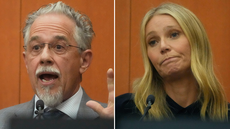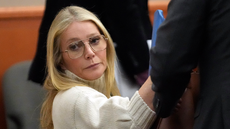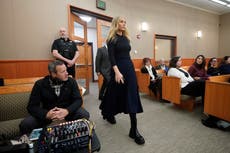The fascinating and bizarre moments in Gwyneth Paltrow’s trial
Cameras in the courtroom create an impression of proximity. They also come with the tantalizing promise of unscripted moments from a celebrity

Your support helps us to tell the story
From reproductive rights to climate change to Big Tech, The Independent is on the ground when the story is developing. Whether it's investigating the financials of Elon Musk's pro-Trump PAC or producing our latest documentary, 'The A Word', which shines a light on the American women fighting for reproductive rights, we know how important it is to parse out the facts from the messaging.
At such a critical moment in US history, we need reporters on the ground. Your donation allows us to keep sending journalists to speak to both sides of the story.
The Independent is trusted by Americans across the entire political spectrum. And unlike many other quality news outlets, we choose not to lock Americans out of our reporting and analysis with paywalls. We believe quality journalism should be available to everyone, paid for by those who can afford it.
Your support makes all the difference.The trial currently opposing Gwyneth Paltrow and a retired optometrist called Terry Sanderson should not be interesting. It’s a civil trial over an alleged ski collision.
Sanderson filed it in 2019, claiming Paltrow skied into him, knocking him out and leaving him with multiple injuries, at an upscale Utah resort in 2016. He originally sued her for $3.1m, but a judge threw out that claim and found Sanderson could not ask for punitive damages. Sanderson is now asking for damages of “more than $300,000.”
Paltrow, meanwhile, has always maintained Sanderson was the one skiing recklessly. In a countersuit, she claimed he knocked her down, and called his claim meritless—an alleged attempt to profit from her fame and wealth. She asked for symbolic damages of $1.
So this is what has been going on inside the Park City courtroom where the trial began last week: two people involved in an alleged ski crash have each sought to blame the other party. If you are a student in law school, then the case might provide an interesting case study in the field of liability and assumed risk. But outside of that scenario, Sanderson v Paltrow doesn’t have quite the makings of a trial of the century. And yet, these days, I cannot glance at social media without encountering a new clip of Paltrow giving testimony, occasionally being asked to state the clear perimeter of her friendship with Taylor Swift, or how generous she is when tipping her ski instructor.
So why? Why has a civil dispute between a famous person and a non-famous person become the most captivating thing on TV?
Maybe procedurals have programmed us to think that what goes on inside a courtroom is exciting, even though reality often suggests otherwise – a recent Associated Press write-up described how jurors “stretched and yawned through hours of testimony that was dense with medical jargon”: “After Sanderson’s attorneys called experts to the stand to describe Sanderson’s health, Paltrow’s attorneys delved into the complexities of different kinds of MRIs and neurological tests, casting doubt on the experts’ conclusions.”
Indeed, only chosen moments of the trial have gone viral – such as when the plaintiff’s attorney Kristin VanOrman asked Paltrow to state her height, and, upon being told that Paltrow is “just under 5’10,’’” replied: “I am so jealous.”
Paltrow’s demeanour on the stand has been relatively fascinating – muted enough to appear respectful, yet slightly baffled at the need to be there, doing this. She has exuded a quiet righteousness, injecting it occasionally with what can only appear, in the gossipy light of social media discourse, as a hint of sass. “I have to wear 4-inch heels just to make it to 5’5,’’” Sanderson’s attorney told Paltrow, following the aforementioned exchange regarding Paltrow’s height. “Well, they’re very nice,” Paltrow replied without hesitation, in a soft, slightly detached tone.
In another instance, Paltrow was asked whether she looked “like everybody else on the slope”, which she said is “always [her] intention.” “Probably had a better ski outfit though, I bet,” VanOrman said, to which Paltrow replied: “I still have the same one.”
At a different time, Paltrow admitted yelling: “You skied into my f*****g back” at one point during the incident, and said on the stand: “I apologise for my bad language.”
There have been the weird attempts on the plaintiff’s team’s part to highlight Paltrow’s wealth, at one point by “[probing her] about the price of ski instructors at posh Deer Valley Resort and her decision to leave the mountain to get a massage the day of the crash,” per The Associated Press. Are we at all surprised that Gwyneth Paltrow, the woman behind Goop, a woman who recently said in an interview that bone broth is one of her lunch staples, might get a massage? Personally, I wasn’t shocked.
And then, there’s the TV of it all. Televising a trial is a surefire way to ensure people care. Were the trial not on TV, all we’d have gotten out of Utah so far would be photos of Paltrow arriving at the courtroom in the morning and leaving it in the evening, as well as reports from inside. We’d have to hear about the actual trial action secondhand, not witness it live. Sure, Paltrow’s outfits would be analyzed in that scenario too, and the most interesting parts of the testimony would make headlines. The outcome of the trial would warrant a write-up or two. But without cameras in the courtroom, we don’t have video clips. We don’t have the experience of gawking at the proceedings collectively. We don’t have the potential for virality.
Cameras in the courtroom create an impression of proximity. When a celebrity is involved, they also come with the tantalizing promise of unscripted moments from a famous party. At the same time, the courtroom is an environment tailored for conflict, for confrontation. It’s similar in that way to a reality show: sure, the participants will say whatever they say in the moment, but the entire setup of their exchange is primed for drama. And so, we watch.
Who knows what the outcome will be? Paltrow and Sanderson have both made serious allegations; juries are hard to read, their reactions quasi-impossible to predict. For every factor that might work in one party’s favor, you can find another one to counter-balance it. (Paltrow’s relative nonchalance has been interpreted by some on social media as the placidity of someone sure of their own innocence, and has not landed so well with others.)
But the fact that this, of all disputes, has attracted so much attention, suggests one thing: our celebrity trial era is not even close to ending.



